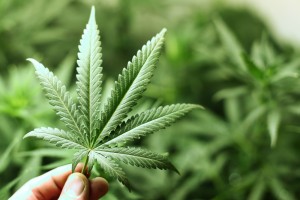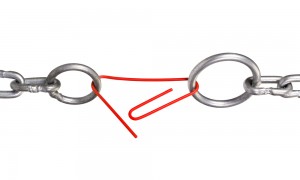
Cannabis is the second most commonly used recreational drug, after alcohol, in the UK. The number of regular users has risen considerably over the past decade, and this has been particularly apparent in the adolescent population.
With this rise there have been concerns about the long term consequences of heavy cannabis use. Cannabis use has been associated with a number of negative outcomes including schizophrenia, memory impairments, and depression. However cannabis use is also associated with a number of other factors- including family adversity, parental drug use, and childhood conduct problems; and these factors are often also linked with negative psychological and mental health outcomes too. This make it very hard to tease apart relationships between drug use and health outcomes, and determining causation rather than just association is therefore very difficult.
So with this background, here is a meta-analysis from earlier this year that assessed the association between cannabis use and depression.
As the authors discuss, a number of cross-sectional studies (Grant, 1995 and Chen, 2002) have demonstrated higher rates of depression in heavy cannabis users, but two previous systematic reviews of longitudinal studies (where participants are followed-up over a period of time) have found mixed and inconclusive findings (Degenhardt, 2003 and Moore, 20o7). This recent meta-analysis aimed to update and expand on these previous reviews.
Methods

Longitudinal studies are required to assess whether cannabis use leads to increased risk of depression
The authors conducted a search for papers assessing the risk of developing depression associated with cannabis use. They included only longitudinal population-based studies that specifically looked at depression and cannabis outcomes, and that either controlled for depression at study entry or excluded individuals with baseline depression.
Effect sizes were extracted or calculated from individual studies, then combined in a random effects model to create a pooled odds ratio (OR) reflecting the odds of developing depression following cannabis use.
Results
- Depression and cannabis use (10 studies): The pooled OR for depression among cannabis users compared with controls was 1.17 (95% confidence interval (CI) 1.05–1.30).
- Depression and heavy cannabis use (defined as participants using at least weekly or fitting DSM-IV criteria for dependence; 7 studies): The pooled OR for depression among heavy cannabis users compared to controls was 1.62 (95% CI 1.21–2.16).
Sensitivity analyses
The authors then ran a series of sensitivity analyses to examine the robustness of the findings. First by including only studies which gained a quality score of at least 8 out of 9 on the Newcastle-Ottawa Scale:
- The pooled OR was reduced to 1.12 (95% CI 1.03–1.37) for cannabis users;
- and 1.34 (95% CI 0.96–1.87; p>0.05) for heavy cannabis users.
And secondly by including only studies with a diagnosis of depression or dysthymia (excluding those with the outcome of depressive symptoms):
- The pooled OR was reduced to 1.17 (95% confidence interval (CI) 0.97–1.41; p>0.05) for cannabis users;
- and 1.43 (95% CI 1.00–2.05; p=0.05) for heavy cannabis users.
Meta-regression
Meta-regressions revealed no association between age of cannabis use onset and risk of depression, and no significant association between length of study follow-up and risk of depression.
Publication bias
There was marginal evidence of publication bias only for the cannabis use analysis. Statistically accounting for this led to a reduced pooled OR of 1.13 (95% CI 1.01–1.27).
Discussion
The authors therefore state they found evidence for a modest increased risk for developing depressive disorders related to cannabis use, and a moderate increased risk of developing depressive disorders related to heavy cannabis use.

This study does not help establish any kind of causal link between cannabis use and depression
However when only top quality rated studies were included the association became less strong; and when a depression diagnosis was used as the outcome the association was no longer apparent. The sensitivity to these changes may question the robustness of this association, and suggests the estimated increase in risk may be inflated.
The strength of this review is that the authors looked only at longitudinal studies; so any depression that existed before cannabis use could be controlled for. However finding an association between cannabis use and depression still does not tell us whether cannabis causes depression. There are still other factors that may be confounding the relationship.
For example, only two studies controlled for parental drug use, and this is known to be linked to both drug use and mental health outcomes in offspring. It is also important to consider other factors that may explain the association, such as socioeconomic factors and other drug use (including alcohol and tobacco). Again while some studies included controlled for these factors, others did not.
Variation in findings may also suggest that different user groups have different vulnerabilities to cannabis use. The authors therefore make an important point that it may be more helpful to focus on the possible mediators of a relationship between cannabis use and depression, by exploring the situations and vulnerabilities that may put some cannabis users at greater risk of depression.
Links
S. Lev-Ran, M. Roerecke, B. Le Foll, T. P. George, K. McKenzie and J. Rehm The association between cannabis use and depression: a systematic review and meta-analysis of longitudinal studies. Psychological Medicine, Available on CJO 2013 doi:10.1017/S0033291713001438 [PubMed abstract]
Chen CY, Wagner FA, Anthony JC (2002). Marijuana use and the risk of major depressive episode – epidemiological evidence from the United States National Comorbidity Survey. Social Psychiatry and Psychiatric Epidemiology 37, 199–206. [PubMed abstract]
Degenhardt L, Hall W, Lynskey M (2003). Exploring the association between cannabis use and depression. Addiction 98, 1493–1504. [PubMed abstract]
Grant BF (1995). Comorbidity between DSM-IV drug use disorders and major depression: results of a national survey of adults. Journal of Substance Abuse 7, 481–497. [PubMed abstract]
Moore TH, Zammit S, Lingford-Hughes A, Barnes TR, Jones PB, Burke M, Lewis G (2007). Cannabis use and risk of psychotic or affective mental health outcomes: a systematic review. Lancet 370, 319–328. [PubMed abstract]


http://t.co/QQhgjjxIdZ
Weak link between cannabis use and depression
Review finds weak link between cannabis use and increased risk of developing depression: Cannabis is the secon… http://t.co/8w8V97hEK0
This is worth your time: “Review finds weak link between cannabis use &increased risk of developing depression” http://t.co/CNdZyat31a
Can cannabis use increase your chances of depression? @claimokr reviews the latest evidence http://t.co/W23ePse4y8
@Mental_Elf @claimokr perfect timing for a paper I’m writing! Nice one Claire!
@soozaphone @Mental_Elf Oo I look forward to reading it! Cheers Suzi
@claimokr @Mental_Elf The intro cites heavily the paper you’ve written about!
Blog illustrating the difficulties in determining links between substance use and psychopathology http://t.co/Udl0mjymKN
@DrugScope Interested in your thoughts on our blog today about cannabis and depression http://t.co/W23ePse4y8
In the news: Review finds weak link between #cannabis use and increased risk of developing #depression @Mental_Elf http://t.co/LbEB0VTcuo
Longitudinal studies are needed to assess whether cannabis use leads to increased risk of depression http://t.co/W23ePse4y8
@Mental_Elf is the cancer causing research not enough? nor the adolescent psychosis research? stop peddling myth cannabis is safe.by omision
Link between cannabis use and risk of developing depression? http://t.co/m31ZhEyqoj @men @Mental_Elf
Me blogging for @Mental_Elf today on review assessing link between cannabis use and depression http://t.co/zPVwXrg34g
@soozaphone I’m guessing U’ve seen this (but if not ‘ere’tis): http://t.co/zu0HSmhBtx @claimokr @garwboy @Mental_Elf
@Schroedinger99 @claimokr @garwboy @Mental_Elf cheers. Indeed I have, and I know that paper well :)
Great blog post by @claimokr for @Mental_Elf on review assessing link between cannabis use & depression http://t.co/DqLs0nfpES
Review finds weak link between #cannabis use and increased risk of developing #depression – The Mental Elf http://t.co/j7NUHywpvK
In case you missed it: Review finds weak link between cannabis use & increased risk of developing depression http://t.co/W23ePse4y8
Mental Elf: Review finds weak link between cannabis use and increased risk of developing depression http://t.co/say2Sqtrgk
Review finds weak link between #cannabis use and increased risk of developing #depression http://t.co/X6oHSwkmeu from @Mental_Elf
Review finds weak link between cannabis use and increased risk of developing depression http://t.co/iC3IAGWSJE via @sharethis